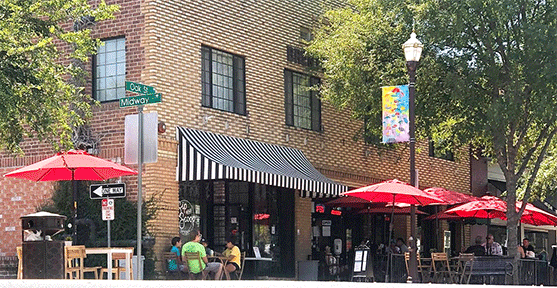Legislation Would Preempt Local Ordinances and Preserve Regulatory Flexibility for Struggling Neighborhood Restaurants
SACRAMENTO, CA — Assemblymember Jesse Gabriel (D – Woodland Hills) has introduced legislation to sustain outdoor dining across California and help neighborhood restaurants stay afloat. If enacted, Assembly Bill (AB) 1217 will preserve the current regulatory flexibility related to outdoor, patio, and al fresco dining and enable restaurants to continue to recover from the COVID-19 pandemic as they navigate rising costs.
“Neighborhood restaurants are the backbone of communities across California, but too many are barely hanging on by a thread,” said Assemblymember Jesse Gabriel. “Outdoor dining has been a critical lifeline that has helped these beloved establishments keep their doors open during these challenging times. AB 1217 preserves important flexibility so that restaurants can maintain outdoor dining in an efficient and affordable manner and continue to serve the communities they call home.”
“Outdoor dining has become an important lifeline for restaurants, and it’s something that we have all come to love and enjoy,” stated Madelyn Alfano, Past Chair of the California Restaurant Association Board of Directors and owner of Maria’s Italian Kitchen, a neighborhood Italian restaurant with several locations in the San Fernando Valley. “Many restaurant owners have invested lots of money to build beautiful outdoor dining spaces to increase their capacity for private events and recoup some of their losses from these difficult past few years. AB 1217 will help sustain this crucial tool and allow local restaurants such as my own to continue to provide delicious meals for our communities.”
“Throughout the pandemic, open-air dining kept many small businesses afloat and also minimized the transmission of COVID-19. It was a win-win,” said Assemblymember Pilar Schiavo (D – Chatsworth), joint author of AB 1217. “By passing AB 1217, we have an opportunity to continue providing the outdoor dining experience to communities across California as well as build walkable streets which open new opportunities for community building and active transportation.”
AB 1217 builds upon AB 61, a previous bill authored by Assemblymember Gabriel and signed into law by Governor Newsom in 2021. This measure provided restaurants with regulatory flexibility on a number of key issues, including enabling more outdoor food preparation and service, allowing restaurants to better use their own spaces for increased outdoor dining capacity, and extending existing orders allowing for alcohol service on outdoor premises.
AB 1217 comes at the heels of a proposed ordinance in the City of Los Angeles that will introduce new restrictions on outdoor dining and require restaurants to apply for expensive new permits for existing patios. If passed, AB 1217 would preempt this ordinance and help local restaurants avoid confusing and costly red tape to keep outdoor dining operations open. The bill is expected to be heard in committee in the coming weeks.
Editors Notes
- Back in January, the City of Walnut Creek adopted an outdoor dining ordinance and fees. Under Council’s direction, the fee for City-owned patios has changed from $36/square foot to $12/square foot. The full program annual net revenue generation, for all outdoor dining types, is estimated at $279,600. Funds collected from on-street PODS, City-owned patios, Sidewalk dining, and Operator Permits will be distributed to the Parking and Downtown Enhancement Fund. Parking In-Lieu fees are distributed to the Parking In-Lieu fund. Application fees will be distributed to the corresponding department budgets in the General Fund.
- It’s been rumored the City of Brentwood, under the direction of certain members of the city council, is set to target outdoor dining and that item will be hitting the agenda at some point in the next month or two. It is still unclear what the final policy will be or if restaurants will be grandfathered in.
- The City of Martinez last year also updated its Downtown Outdoor Dining and Retail Program Guidelines

